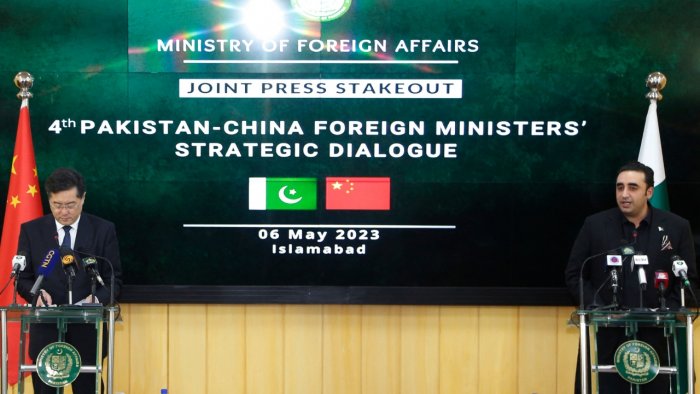Pakistan’s Foreign Minister Bilawal Bhutto Zardari has categorically endorsed that Pakistan will continue to support China on all core issues of its national interests as the Pakistan-China friendship is irreversible. Addressing a joint press stakeout alongside his Chinese Counterpart in Islamabad, Mr. Zardari underscored the support both nations had for each other on issues of core interests in both bilateral and multilateral forums and appreciated China’s steadfast support to Pakistan in all issues including the core issue of Jammu and Kashmir. Foreign Minister Bilawal Bhutto Zardari termed the CPEC a win-win initiative for both nations and strongly rejected the notions of so-called debt sustainability or debt trap propaganda that had been continuously propagated against Chinese investments and financial support to Pakistan. Meanwhile, the Chinese Foreign Minister and State Counselor, Qin Gang hailed all-weather Pak-China friendship and appreciated Pakistan’s crucial support for Beijing at global forums. Foreign Minister Gang assured that China will always work with Pakistan through the platform of CPEC, to align bilateral development strategies, share China’s development opportunities, and build an even closer China-Pakistan community with a shared future.
Pakistan and the People’s Republic of China (PRC) are brothers in arms and time-tested friends. Their friendship has proved its resilience during all odds in the past and firmly stood in the face of extreme coercion of the United States and its allies in recent years. Both nations are engaged in multiple bilateral and multilateral formats and actively pursuing their mutual goals through joint work and cooperation. The recent round of the Pak-China Strategic Dialogue briefly covered all aspects of bilateral relations between the two nations. The leadership from both nations identified the marvelous project of the China-Pakistan Economic Corridor (CPEC) as a main pillar of their bilateral collaboration and agreed on aligning bilateral development strategies, sharing each other’s resources, expertise, and opportunities to build a shared and prosperous future for their people.
The current geopolitical environment and global competition pose serious challenges to the ever-flourishing Pak-China partnership, as Western adversaries are trying to disrupt and undermine Sino-Pakistan relations through continuous middling, conspiracy theories, and unrestricted propaganda campaigns. The US-led Western bloc had been persuading Pakistan to abandon Beijing and join the Western club amid heightened rivalry between China and the United States. Traditionally, Islamabad had enjoyed a good relationship both with Beijing and Washington throughout the past. Pakistan categorically refused to be a part of any bloc politics and expressed its willingness to play a bridging role between two warring nations. However, Islamabad faced unprecedented challenges in maintaining its neutrality amid economic frailty and worsening payment deficient crises over the past year. Recently, Islamabad decided to distance itself from the China-centric so-called democracy summit hosted by the Biden administration, which clearly illustrates Pakistan’s sincereness toward China’s national interests and sovereignty. Resultantly, Pakistan failed to receive substantial economic aid from the IMF despite fulfilling all pre-conditions obviously due to Washington’s displeasure and the US’s unimaginable influence over the global lender.
During the recent Pak-China Strategic Dialogue in Islamabad, Pakistani leadership undoubtedly discredited Western propaganda against the CPEC and Chinese investment in the country. Islamabad reconfirmed its support for China and Foreign Minister Bilawal called the Sino-Pakistan friendship irreversible. State Counselor Gang reiterated China’s economic, political, and diplomatic support for Islamabad and acknowledged Pakistan’s real concerns regarding resurrecting terrorism in the region. Realistically, Pakistan should not be a part of global power politics and alliances against any nation in the world. However, Islamabad must first protect its national interests and take care of the genuine needs of its partnering nations including China, the US, Saudi Arabia, Iran, and other friendly nations having conflicting ideologies and manifestos. The Islamabad Summit has removed all misperceptions about the Pak-China relationship and reinvigorated hopes regarding the realization of broader regional connectivity, economic revival, and prosperity that equally benefits all nations in the region.







